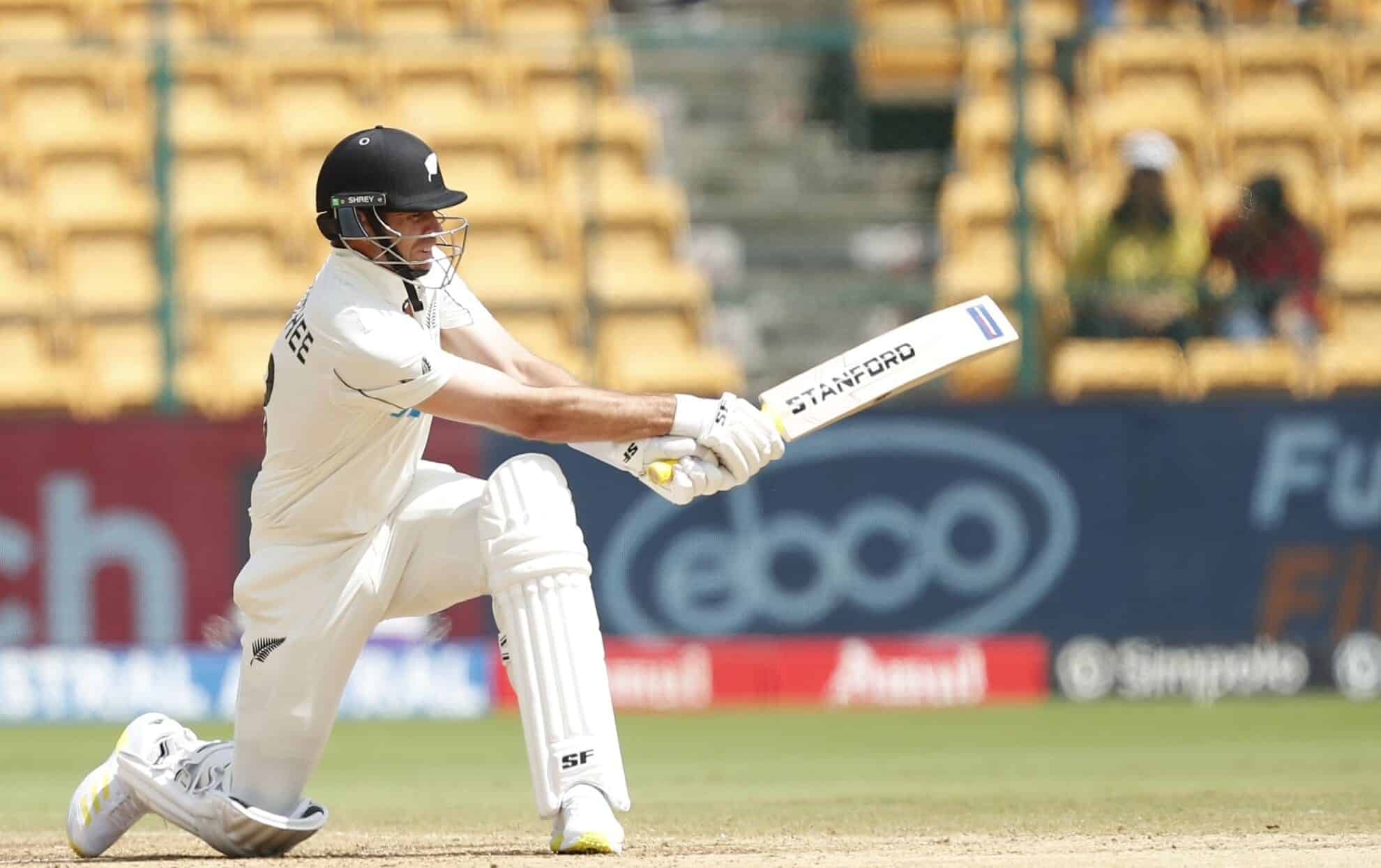October saw two truly remarkable Test series. England “toured” [can we still use that word? I think not, but never mind] Pakistan for the second time under Ben Stokes’ captaincy. The 2022 visit saw “Bazball” at its invincible best, with Pakistan suffering a three-nil whitewash for the first time ever. This time, the first Test at Multan saw the Root-Brook runathon and a massive England win. Pakistan responded by dropping several of their senior players, picking two spinners who were very experienced in first-class cricket, and playing the second Test on exactly the same strip as the first – an experiment that seems unlikely to be repeated. Pakistan won that game and the third Test at Rawalpindi. Stokes’ record in Asia, following the disappointing defeat in India, is not looking so good.
Meanwhile, in a genuinely astonishing result, New Zealand went to India for the rare treat of a three-Test series and won three-nil. It really is difficult to exaggerate the scale of this achievement. India have not lost a home series to anyone since 2012-13 (Alastair Cook’s England won a close series 2-1). New Zealand had never won a series in India since their first visit in 1955-56. They had played 36 Tests in India and won only two of them. Their last victory in India was at Wankhede in 1988-89. Their best batter, Martin Crowe, was missing, as was Kane Williamson this time. Richard Hadlee took six for 49 and four for 39. India won the series 2-1.
What, if anything, does this tell us? One thing is obvious but needs constant emphasis: no experience in cricket matches the endless fascination of a keenly contested Test match. One longs for five-match series, but we have to be grateful for what we can get. Notwithstanding the apparent gap in results, both series were keenly contested; the only game of the six that was not keenly contested was that first match at Multan. It is no disrespect to Joe Root and Harry Brook to say that watching such gargantuan run-scoring can be a bit tedious. Low-scoring Tests are always more exciting unless the pitch is so bad as to take skill out of the equation.
England and India clearly have lots of questions to answer. One might well say the same of Pakistan, but Pakistan always has questions to answer. The internal chaos seemed no closer to a resolution at the end of the series than it was at the beginning, but most real cricket people will have been pleased to see them win.
England were frustrating in a way that is becoming worryingly familiar. So often, they seem to get into a position from which they ought to be able to win but do not push on to victory. This did not happen in the early days of “Bazball”. On the contrary, in that amazing summer of 2022, they often seemed to be in a position where they might lose but escaped from that, put pressure on the other side, and won. It is not entirely clear what has gone wrong since. Maybe opponents have simply “wised up” to “Bazball” and are not fazed by it. The creators, on the other hand – “Baz” McCullum and Stokes – despite repeated claims to the contrary, seem sometimes to be carried away by enthusiasm for the product. This is the only possible explanation for some strange decisions, most obviously not enforcing the follow-on at Wellington in 2022-23, which led to New Zealand winning a game that England had in the bag, and the decision to declare on the first evening of the first Ashes Test at Edgbaston in 2023, when Root appeared to have the Australian attack at his mercy. It also seems to explain some of England’s batting, certainly in India and Pakistan, and some of their cricket in the third Test against Sri Lanka this summer. Even losing, it seems, is better than being “boring”. But sometimes you have to be boring to win a Test. That is the way five-day cricket works, as, in fairness, Root and Brook amply demonstrated in the first Test.
This hubris has affected selection policy too. England now pick on instinct rather than experience. To be fair, some of their hunches have sort of worked. The young spinners, Rehan Ahmed, Tom Hartley (remember him?), and Shoaib Bashir, have all had their moments. But unfamiliarity is an underrated weapon in Test cricket. Remember Bob Massie, the Australian swing bowler who took 16 wickets in the Lord’s Test of 1972? He didn’t take too many more after that. England’s most experienced spinner is Jack Leach, who has taken 142 wickets in 39 Tests at an average of 34. People will accuse me of going back to the irrelevant dark ages, but I really think that in the 1970s, 1980s, and 1990s, most county sides had at least one finger spinner who was as good as Leach and was never considered for England – Edwin Smith, Ray East, Don Shepherd, Peter Sainsbury, David Hughes… one could go on. And then there were the ones who did play for England: Fred Titmus, David Allen, Ray Illingworth, Derek Underwood, Phil Edmonds – they were artists. Pakistan’s spinners, who made most English batters look like novices, have played relatively little Test match cricket but plenty of first-class cricket. That is where they learned their craft. This is not going to happen in England while the County Championship is played predominantly in April, May, and September, which means for the foreseeable future, in that the Hundred appears to be doing what the administrators want it to do. This means that England’s batting against spin will also not improve.
But back to selection. The “Bazball” approach is clearly evident in the selection of the Test squad for the imminent visit to New Zealand. They have picked three spinners. This seems very odd. Ajaz Patel, who has taken 25 wickets in two Tests at Wankhede, has yet to take a wicket in New Zealand. And the spare batter is Jacob Bethell, who has played 20 first-class matches and has a highest score of 93. He could end up playing – who knows. The reserve keeper, Jordan Cox, will definitely play. The world’s best keeper, Ben Foakes, has to face the fact that, like many gifted and successful county cricketers – Hampshire’s James Vince and Liam Dawson spring to mind – there is simply no room under the current regime.
New Zealand’s historic win was a testament to discipline, teamwork, and common sense as well as talent. As Phil Walker observed on the Wisden podcast, it showed what an opportunity England missed when they were in India in early 2024.
The first Test at Bengaluru saw India bowled out for 46. That can happen to any side. At Adelaide in 2020-21, India were bowled out for 36; they lost the match but won the series. Here, they fought back heroically through Virat Kohli, Sarfaraz Khan, and the electrifying Rishabh Pant. It wasn’t enough; New Zealand won by eight wickets. There were two centurions in the match, the two relative newcomers, Sarfaraz, who had looked so good against England, and New Zealand’s scintillating Rachin Ravindra.
The other two games, at Pune and the Wankhede in Mumbai, were quite different. No side reached 300, and the games were dominated by spinners – not, as one might have expected, R Ashwin and Ravindra Jadeja, though Jadeja took ten wickets in Mumbai, but Mitchell Santner and Patel. Santner, who had never taken a Test match five-for, took 13 in the match at Pune. To score runs in these conditions, you had to be a traditional Test match batter, like Player of the Series Will Young and Daryl Mitchell. But it is wonderful to see a series victory in which literally everybody made a significant contribution. Veteran seamer Tim Southee only bowled a few overs in the series, but in Bengaluru he belted a lively 65, putting on a crucial 137 for the eighth wicket with Ravindra. In the course of this innings, Southee became the sixth most prolific six-hitter in Test history, after Stokes, McCullum, Adam Gilchrist, Chris Gayle, and Jacques Kallis. How can you not love New Zealand?
This was a chastening experience for India. The old guard, particularly Rohit Sharma, Kohli (after the first Test), and Ashwin, struggled. One kept expecting India to fight back, but they couldn’t. One good thing, one of the best things about a magnificent series – nobody is going to say India are a pushover in their own backyard – is that the crowds were very good in all three venues.
This result, and others, has made the fight to qualify for the World Test Championship at Lord’s in June 2025 very intriguing. India, who seemed to be a shoo-in, as in the last two contests, will have to beat Australia in the upcoming five-match series, which looks like a big ask. South Africa have home series coming up against Pakistan and Sri Lanka and look handily placed. But if Sri Lanka can beat South Africa 2-0, as they did in 2019, and then beat Australia in early 2025, they might qualify.
And then of course there is New Zealand. It looks as though they will need to beat England at least 2-0 to qualify. They must now be favourites to win the series. I am not sure that the selection of Leach, Shoaib, and Rehan is going to help England win the series. My feeling is that James Anderson would get more wickets than the three of them combined. But, as the philosopher Jagger tells us – and as Anderson would be the first to acknowledge – you can’t always get what you want.





2 comments
Malcolm Merry
Nothing new about England batsmen succumbing to spin on dry sub-continental surfaces. What is new is that under the aggressive BB regime they now do so faster than before.
Richard Pettinger
Terrific and really thoughtful piece. I too am kind of perplexed about Foakes not playing – i think that his personality must not have fitted in as he is a great attacking batter, and can also adapt to any situation. Also the failure to pick Dawson when we (England) are clearly trying to set up a spin attack is a bit puzzling – if he was picked now he would have at least two years in the test team (and he is a regular in first class/red ball cricket). Symptomatic of a changing world, and hoping that what they are building sets up a great test team for the period 2025-2027.